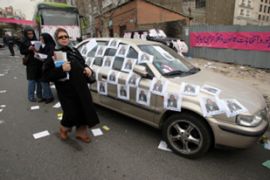Conservatives lead Iran vote
Early returns show strong support for reformists in cities where they competed.

Published On 15 Mar 2008
Reformist leaders pushed for Iranians to vote, hoping to prevent a sweep by Ahmadinejad’s allies after the country’s religious leaders threw many liberal candidates out of the race.
Vote or boycott
Nearly half the seats won by conservative politicians so far were in districts where no reformist candidates were running – a sign of the impact after reformist ranks were cut by the cleric-led Guardian Council.
The returns, mostly from smaller towns, were insufficient to determine any solid trend.
According to reformist leaders, their candidates were allowed to run in only about 90 of the races.
The unelected Guardian Council rejected about 1,700 candidates, mostly reformists, on grounds of insufficient loyalty to Islam or Iran’s 1979 revolution.
Many Iranians who support liberal reforms spent Friday deliberating with friends and family, going back and forth between two options: vote and give legitimacy to an election many of them saw as unfair, or boycott and ensure an even stronger conservative domination of parliament.
In the end, Hesam Javadi, a 30-year-old computer technician, voted.
“We can’t stop the rain,” he said after casting his ballot for reformists at a north Tehran polling station.
“But we can at least put an umbrella over our heads in self-defence.”
Fumbled efforts
|
“…in essence the results … are cooked. They are cooked in the sense that the Iranian people were not able to vote for a full range of people.” Sean McCormack, US state department spokesman |
Some 44 million Iranians of over 18 years of age across the country were eligible to vote.
Reformists were hoping that a strong turnout can win them a large enough minority bloc in parliament to at least have an impact after four years with only a small presence.
Perhaps the more crucial test will be of Ahmadinejad’s support among conservatives. Some have become disillusioned with the president since he came to office in 2005 and have formed a slate of candidates competing against a list of supporters of the president.
If they do well, it could raise the chances Ahmadinejad will face a challenge from moderate conservatives in presidential elections next year.
Mohammad Baqer Qalibaf, Tehran’s mayor often touted as a possible candidate for president, is said to back the list of Ahmadinejad’s critics.
Conservative critics say Ahmadinejad has fumbled efforts to fix the economy of this oil-rich nation – hit by high inflation and unemployment and fuel shortages.
“Cooked results”
They blame his fiery manner for worsening the standoff with the West, bringing on UN sanctions over Iran’s nuclear programme.
Before Friday’s vote, Ayatollah Ali Khamenei – the supreme leader who holds final say in all state matters in Iran – appeared to give his support to the Ahmadinejad camp.
He urged Iranians to elect the candidates the United States opposes and “whose loyalties are to Islam and justice”.
In Washington, Sean McCormack, the state department spokesman, criticised the elections, saying “in essence the results … are cooked. They are cooked in the sense that the Iranian people were not able to vote for a full range of people”.
About 4,500 candidates nationwide are running for parliament’s 290 seats. Final results will take days.
Source: News Agencies